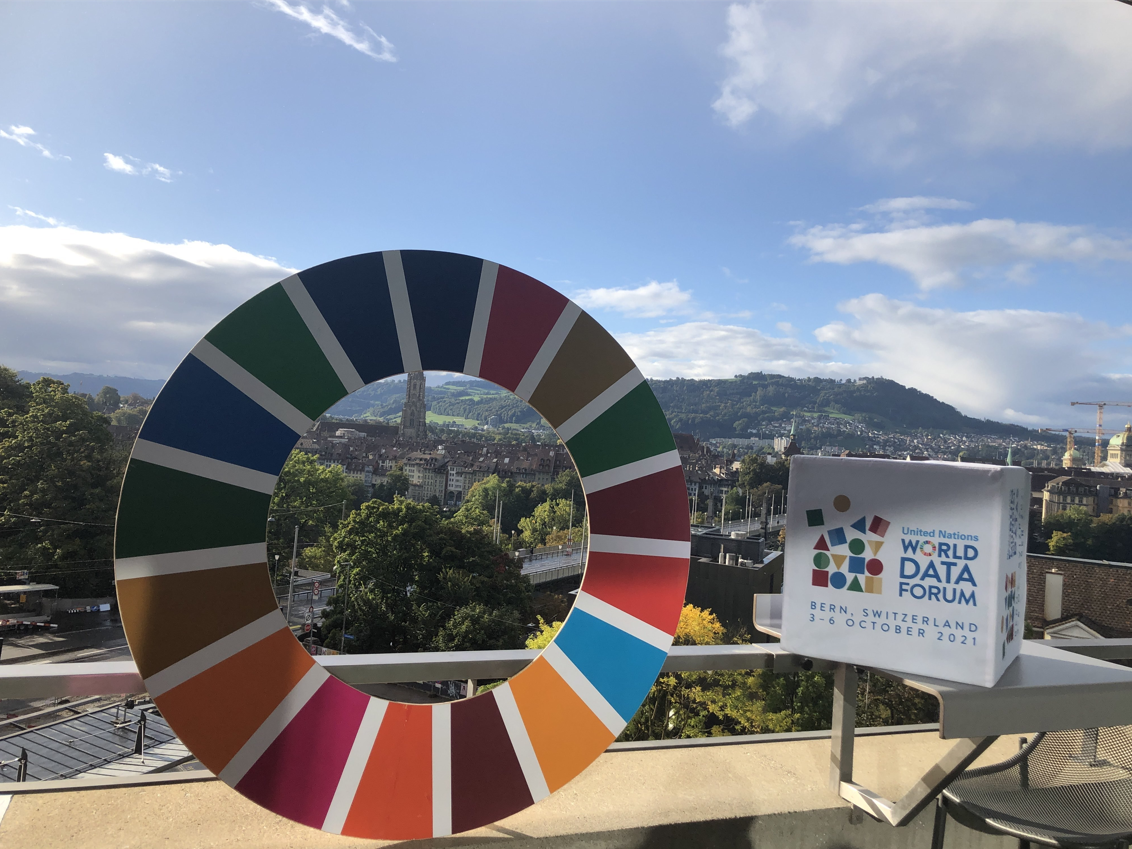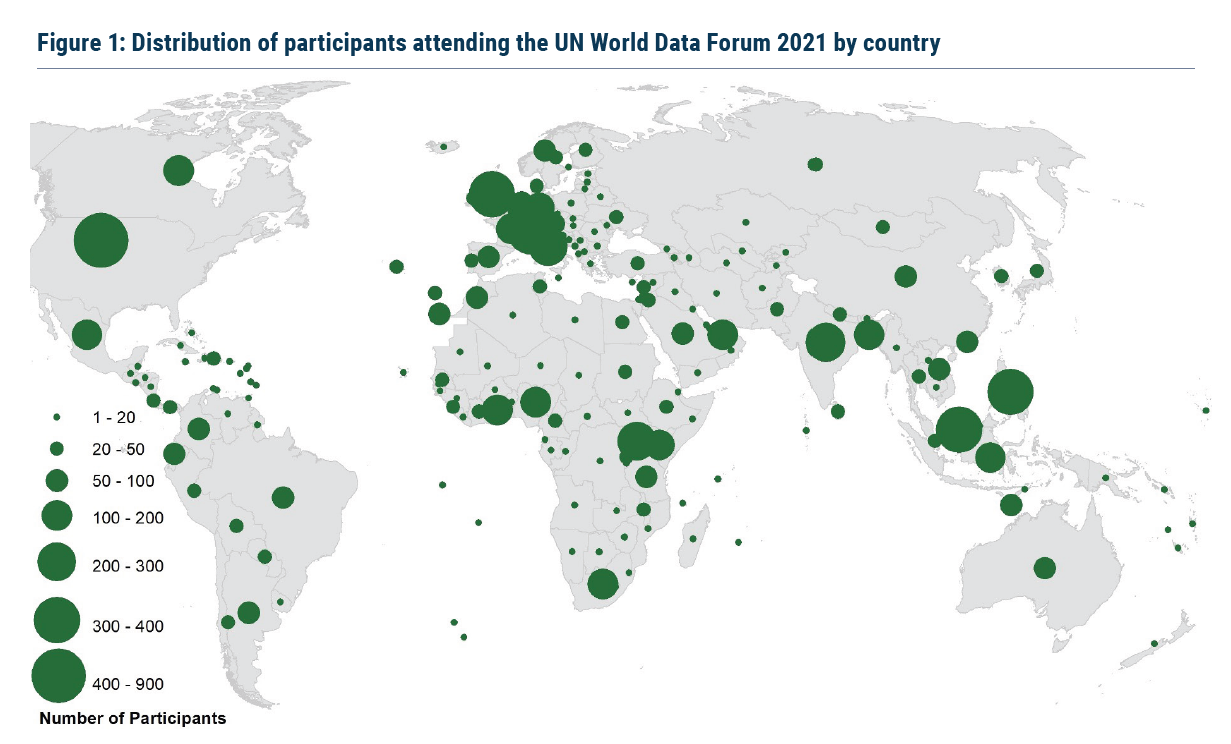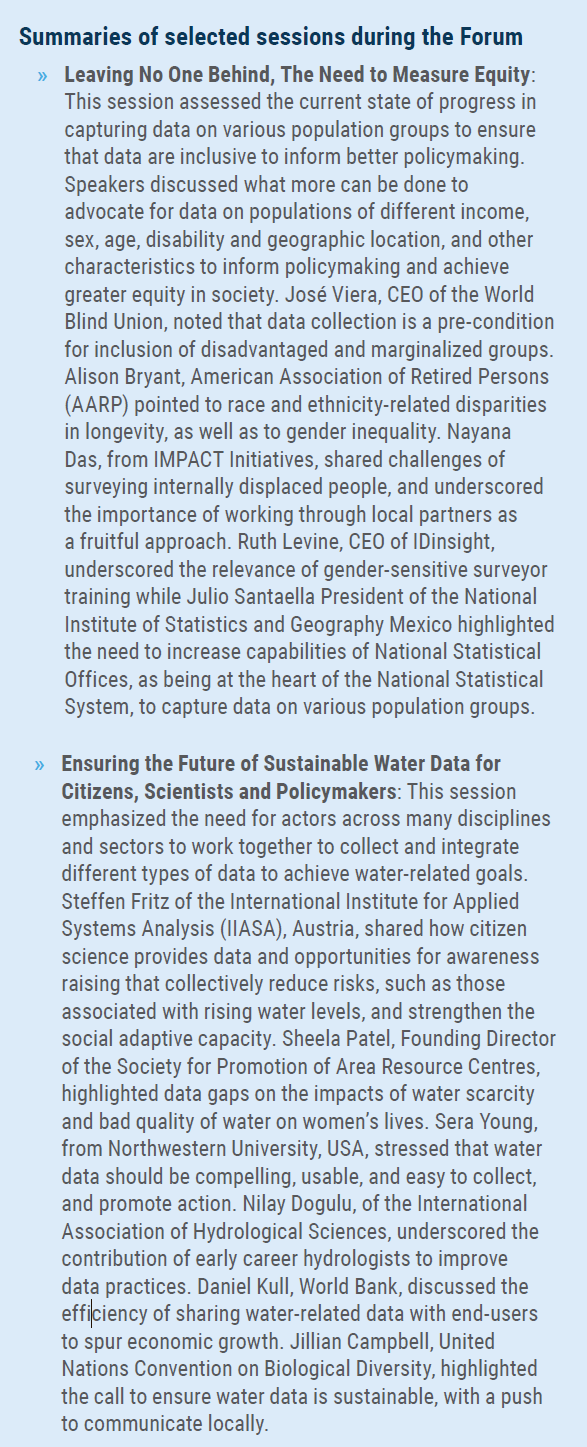
Building a strong data community
Since its inception in 2017, the United Nations World Data Forum has brought together the data community to spur innovation, nurture partnerships, and mobilize high-level political support and a financial commitment to build a pathway to better data for sustainable development. The third Forum, held in Bern, Switzerland, in October 2021 brought together over 700 participants in person and over 7,000 virtually, representing a diverse group of stakeholders from the data and statistics community, joining from over 180 countries around the world (Figure 1). The Forum discussions stressed the need for greater collaboration and coordination for inclusive data to leave no one behind; increase financial support; enhance the capacities of National Statistical Offices; and promote greater inclusion of, and access by, marginalised communities.  The Forum also discussed new approaches to statistical capacity development and mobilization of financial support to leverage the opportunities of the new data ecosystem where policy and decision-takers, National Statistical Systems, civil society, the private sector, the geospatial community, and other data actors can work together in a truly collaborative way. Key areas where further capacity efforts and better financing are needed include improved data security, the promotion of accountability and better engagement with policy- and decision-makers, at international, national, and sub-national levels. The Forum’s discussions also stressed the importance of data governance systems and principles, along with nurturing a dialogue among the broad community of data experts, to prevent misuse of information. Speakers stressed the role of communication and engagement with users in increasing data literacy and combating disinformation and misinformation.
The Forum also discussed new approaches to statistical capacity development and mobilization of financial support to leverage the opportunities of the new data ecosystem where policy and decision-takers, National Statistical Systems, civil society, the private sector, the geospatial community, and other data actors can work together in a truly collaborative way. Key areas where further capacity efforts and better financing are needed include improved data security, the promotion of accountability and better engagement with policy- and decision-makers, at international, national, and sub-national levels. The Forum’s discussions also stressed the importance of data governance systems and principles, along with nurturing a dialogue among the broad community of data experts, to prevent misuse of information. Speakers stressed the role of communication and engagement with users in increasing data literacy and combating disinformation and misinformation.
 Not one part of the data ecosystem can do it alone
Not one part of the data ecosystem can do it alone
What emerges from the Forum is that different stakeholders in the data ecosystem are learning to 'trust each other' in identifying solutions for integrating data sources, exchanging data more effectively, and engaging more widely with policy- and decision-makers. However, more needs to be done for data and statistical systems to fulfil users’ needs and provide timely, open, inclusive and high-quality data for sustainable development and to accelerate the implementation of the 2030 Agenda. There are urgent needs for existing, tested solutions to be scaled up, good data governance to ensure data rights and protection, and privacy protection, while ensuring data are used and re-used to the largest extent possible, and full political commitment to prioritize data as a strategic decision-making asset and ensure adequate financing for it. All parts of the data ecosystem have specific responsibilities. The Bern Data Compact represents an important step for accelerated action on the implementation of the Cape Town Global Action Plan (CTGAP) for Sustainable Development Data launched at the first Forum . Over the next few years, as the CTGAP is being reviewed and updated, it will be key for the data community to ensure a system of accountability, with each Forum reporting on concrete progress made in each area.
Launch of the Bern Data Compact
The Bern Data Compact for the Decade of Action on the Sustainable Development Goals (SDGs) was launched at this Forum. It recognizes the value of data as a strategic decision-making asset and defines the data ecosystem needed to use this asset effectively for people, planet, prosperity, and peace. The Bern Data Compact evolved out of the CTGAP and the Dubai declaration, launched at the second Forum, on how to finance and implement CTGAP. The Bern Data Compact appeals to all actors within the wider data ecosystem to play their part to accelerate action to implement the CTGAP, the current framework for planning and implementation of data and statistical capacity building necessary to achieve the 2030 Agenda for Sustainable Development. The Bern Data Compact identifies six areas where further commitments are needed to strengthen the data ecosystem:
New approaches to capacity development for better data
Fit for purpose, open, interoperable, and nationally coordinated public data require sufficient national institutional capacity and robust national data systems. Greater commitment to invest in the necessary skills and infrastructure is needed from Governments, the private sector and civil society, supported where necessary by the donor and philanthropic community, with new approaches that ensure national priorities are clearly identified and respected in all donors' programmes and interventions.
Innovations and synergies across data ecosystems
The full potential of administrative records and new and innovative data sources cannot be realised without public-public or public-private partnerships to remove all barriers to their use while ensuring full respect for privacy and confidentiality. National statistical systems must work closely with the broader data ecosystem to foster synergies and innovative practices with these sources.
Leaving no one behind
The principle of “leaving no one behind” defined in the 2030 Agenda for Sustainable Development implies that disadvantaged and marginalized populations are represented in the decision-making process and by extension represented in the data supporting this process. Currently large data gaps exist on the status and needs of people of different income, sex, age, race, ethnicity, migratory status, disability and geographic location, and other characteristics. Filling these gaps involves more collaboration between national statistical systems and the wider data ecosystem to replicate standards, use innovative tools and collect citizen-driven data along with official data.
Understanding the world with data
Data can only be used effectively if the data ecosystem promotes and instils data literacy among the public to empower them to identify misinformation and abuse. Governments, the private sector, and the media can help by presenting data in a timely, open, and impartial manner Any data with bias should be clearly flagged and reported to users.
Building trust in data
Good data governance is the foundation for trust in data. Through laws, regulations and good practice, the data ecosystem can safeguard the privacy and confidentiality of individual and business data while maintaining transparency and accessibility to data of public interest.
Investing in data
Smarter and increased investments in data are needed to address the huge data gap in informing the implementation of the 2030 Agenda for sustainable development and measuring its progress. In this regard, two innovative and complementary solutions for smarter financing for data were launched during the Forum as follows:
The Bern Network’s Clearinghouse for Financing Development Data, a new, free online platform providing access to data on over 15,000 projects for strengthening data and statistics, allows aid recipients, donors, and the public at large to understand data financing flows, identify funding gaps, and connect to new communities of experts. The Clearinghouse aims to close the large data financing gap that is preventing progress on tracking the achievement of SDGs. It was developed by the Bern Network on Financing Data for Development, a multi-stakeholder alliance created in 2019 by the Swiss Government to promote more and better funding for development data.
The Global Data Facility is the new, World Bank-hosted fund to support data and statistics priorities at the global, regional, national, and community levels. The Global Data Facility will support investments in both the fundamentals and the frontiers of data and statistics, including support to modernize data systems and tap into a range of new data sources for better decision-making, improved efficiency, and strengthened data integrity at scale. The Facility is designed to leverage significant additional financing to enable long-term support and durable data and statistics transformations. Additionally, it will support the Bern Network Clearinghouse to serve as a global coordination mechanism for a wide range of partners, practitioners, and country clients to join forces in support of the global data revolution.
 Welcome to the United Nations
Welcome to the United Nations